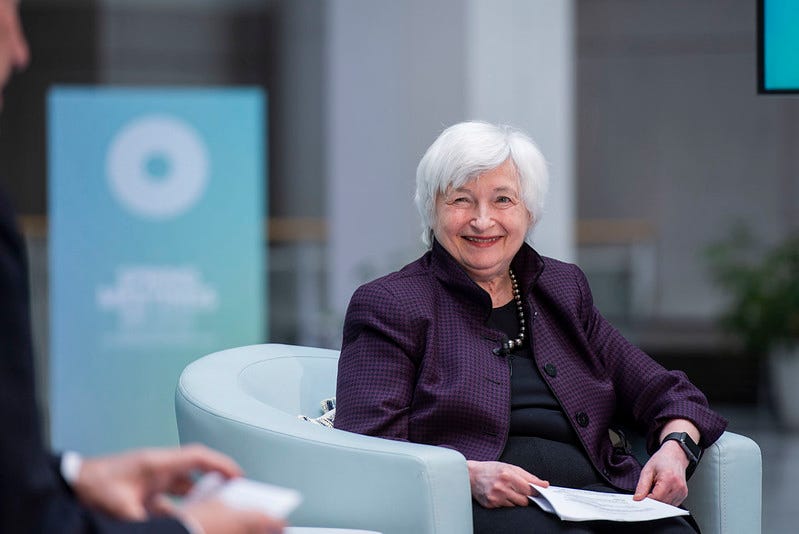Welcome to Just Two Things, which I try to publish daily, five days a week. Some links may also appear on my blog from time to time. Links to the main articles are in cross-heads as well as the story.
I wrote about inflation earlier this week, but the bigger story about inflation isn’t about economics. It is about political economy.
Because an economic policy that prioritises inflation over other policy objectives )such as full employment) is a policy that is designed to benefit finance and the rentier class at the expense of the rest of us.
The New Left Review’s blog, Sidecar, has a post by the radical economist Cedric Durand that takes a long view of this story, going back to 1979 when President Carter appointed Paul Volcker as chair of the US Federal Reserve Board, with a strong mandate to tackle inflation:
In late 1980, interest rates reached a record high of 20%, and inflation fell from a peak of 11.6% to 3.7% in 1983. For the capitalist class, this came with an economic and political bonanza. The rate hikes triggered a severe recession, precipitating a wave of restructuring and lay-offs that helped to crush the trade unions, demoralize the left and discipline the global south. The result was a ‘revenge of the rentiers’, and a well-documented surge in inequalities.
One description of this is the ‘Volcker coup’. The ‘70s had been a period of acute economic conflict, both between capital and labour in the global North, and between the countries of the global South and the multinationals of the the global North.
Stabilize prices, crush labour, discipline the south.This was the basic logic of the 1979 coup. For four decades, financial returns were systematically prioritized over labour standards, employment, ecological conditions and development prospects.
Now, with Biden in the White House, and Janet Yellen as Treasury Secretary, there are signs that we’ve reached the end of this road.
(Treasury Secretary Janet Yellen. Photo: World Bank, CC BY-NC-ND 2.0).
It’s early days, but Durand points to a couple of factors to support this story:
- the universality of the American Rescue Plan—“over 160 million Americans had received a Treasury check” by April
- the scale of the Biden stimulus package, which is “designed to generate a high-pressure economy”—which in turn involves some inflationary risk.
This is the bit that suggests that we’re seeing “1979 in reverse”—because since 1979 if it’s been a choice between inflation in check and keeping labour in check, labour has lost out.
Of course, there’s a logic to this. The first part of this is that financial markets have been on life support since the financial crisis, kept afloat by central bank support.
The second part is that the challenges that the Biden administration has identified—climate change, inequality, China—won’t get fixed by taking a lead from the finance sector. (To say the least). There’s a lot more detail on this in the piece, but the important part is that this is more than policy noise:
Moves to strengthen the relative position of labour, to overturn rentier-class tax privileges and to reject the neoliberal wisdom that market coordination is always preferable to state intervention: these signals amount to more than just a rhetorical shift. They point to a structural break in the regulation of capitalism, the shockwaves of which will reverberate in the global political economy for years to come.
Durand doesn’t think it is enough—it probably won’t have a big enough impact to address the big structural problems that it looks to tackle. But even so:
2021 will be remembered as the moment when global capitalism was reorganized beyond neoliberalism, a tectonic shift that will irrevocably alter the terrain of political struggle.
There’s a couple of extra points here.
The first is one of the long run patterns that I use to understand change is that regulatory regimes tend to last about 40 years before they run out of steam and need radical reform. So this probably is a change that will stick.
The second is Blackrock’s Larry Fink, getting his second namecheck in Just Two Things in two days. When he says, as he did this week, that—essentially—it’s more important to keep inflation under control than to take radical action on climate change, he’s just reminding us all which side he is on.
#2: The supersonic plane hustle
I don’t normally link to Twitter threads here, but I’m making an exception today because there’s an exceptional thread by Dan Anderton this week unpacking the announcement last week by Boom—with support from United Airlines—of a new supersonic plane.
Too long don’t read? He’s more sceptical than most of the journalists.


I’m just going to pick up from the thread ten reasons for his scepticism.
1. The technical, economic and regulatory hurdles are huge
2. The finance required is vast—Boom seems to have raised $240m of an estimated $6 billion required
3. Trivial airline support
4. No identified engine manufacturer, beyond one of those phrases about exploring options with Rolls Royce
5. Difficult market segment to make work (as Concorde has previously demonstrated)
6. Supersonic flight requires somewhere between five and ten times the amount of fuel per passenger as a conventional airline (just parking climate change for the moment)
7. Sustainable aviation fuels currently too expensive and may never be available in the quantities required for supersonic flight (see point 6 above)
8. The environmental damage of a supersonic plane is around 20 times that of a subsonic plane
9. Supersonic planes create a sonic boom that can’t be mitigated, in a world that is less patient about noise pollution than it was when Concorde was flying
10. There’s no international regulatory standards governing supersonic flight, and hostility from the EU, from civil society organisations, and even from airports.
(The last supersonic service. Concorde landing at Kansai International Airport. Image: by Spaceaero2 via Wikimedia, CC BY-SA 3.0)
As Anderton concludes:
So, in summary. Do I think commercial SSTs will succeed? Nope. Would the env impact be large if they did? Yup. Is this all a huge distraction from the real challenge of decarbonizing aviation?
(H/t Charlene Rohr for the link).
j2t#115
If you are enjoying Just Two Things, please do send it on to a friend or colleague.




